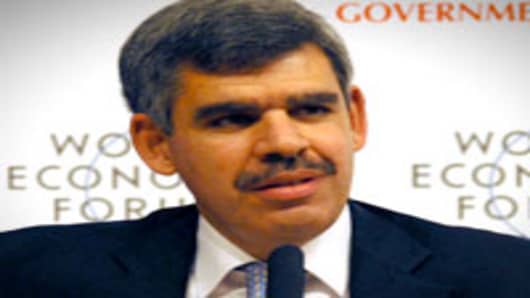Extending the Federal Reserve's easy-money policies would be a mistake for an economy that badly needs to learn how to live without artificial stimulus, Pimco's Mohamed El-Erian told CNBC.
As Fed Chairman Ben Bernanke delivers his semi-annual policy update to Congress, El-Erian said the central bank ought to be weighing how it will exit the second leg of its multi-trillion dollar quantitative easing program, often called QE2.
El-Erian used an automotive analogy to demonstrate what he thinks should be Bernanke's position.
"Think of your car having stalled and someone comes along with jumper cables and starts it. At some point, you have to take the cables off and see whether the car will drive," he said. "The reality is if we go to QE3 we're going to find very quickly that the costs and risks of these unconventional policies are going to offset what the benefits are."
There has been increased talk lately—including from St. Louis Fed President James Bullard in a CNBC appearance Monday—that the central bank may stay with its $600 billion Treasury-buying target but extend the time frame of the program beyond the original June deadline.
That approach could benefit the Fed as it would allow policy makers to examine the direction of the economy and what will be needed going forward, El-Erian said.
The last time the Fed backed away from easing, though, was nearly a year ago and a 17 percent stock market decline followed, highlighting the challenges ahead.
"We should hear from Bernanke what he thinks about the natural rate of unemployment and where he thinks this economy can soft land and what does it take to achieve escape velocity," El-Erian said. "We can't forever continue with this stimulus, not only with this on the monetary side but remember we also have stimulus on the fiscal side and the debt issue is becoming a big problem."
Global eruptions, particularly in the Middle East, are "moving very quickly and moving in an unthinkable way," yet without normal flight-to-safety investments taking place, he added.
"What hasn't happened is US assets, particularly the dollar, have not benefited from the flight to quality and the flight to safety that you would have expected," he said. "That is a clear warning shot that we have to take seriously."




